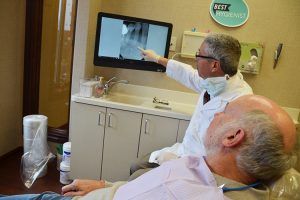People are living longer. Many things contribute to this healthy longevity. People exercise, eat healthy, don’t smoke, get plenty of sleep, maintain a good social network and engage in mentally challenging activities and take advantage of advances in medicine.
 However, there’s another, largely overlooked, ingredient: oral health care. As we age, our bodies become more vulnerable, so decay, infections and bacteria that occur in teeth, gums and mouth can grow into serious problems that affect your overall health. Vascular (blood vessel) complications can led to bacteria getting into your bloodstream. Plus, other issues that impact seniors can make problems worse and inhibit a senior’s ability to brush, floss or visit the dentist.
However, there’s another, largely overlooked, ingredient: oral health care. As we age, our bodies become more vulnerable, so decay, infections and bacteria that occur in teeth, gums and mouth can grow into serious problems that affect your overall health. Vascular (blood vessel) complications can led to bacteria getting into your bloodstream. Plus, other issues that impact seniors can make problems worse and inhibit a senior’s ability to brush, floss or visit the dentist.
Poor oral hygiene and infrequent dental care can increase risks for diabetes, pneumonia, infections elsewhere in the body and strokes. Some studies suggest gum disease can lead to heart disease. Also, mouth cancers — which can be discovered through regular dental checkups — can go undetected.
One of the most common oral health issues faced by older men and women is dry mouth.
As you get older, you may notice a mild decrease in saliva — this is natural. Saliva is natures way of helping preserve gum and tooth health (brushing and flossing are very important too). Saliva helps neutralize the acid that is produced by bacteria in our mouth. Dry mouth can often be caused by many medications which inhibit production of saliva. In some cases, it can be caused by reactions to cancers in the head and neck area.
If you experience dry mouth, also called xerostomia, please schedule an appointment at our office. Be sure to bring along list of all medications you are currently taking. As part of our exam we’ll also perform an oral cancer screening.
The recommendations we’ll provide you will not only ensure a healthier mouth, but by increasing moisture and saliva in your oral cavity you’ll simply feel better.
In addition, follow these tips from the Centers for Disease Control to maintain good oral health.
- Drink fluoridated water and use fluoride toothpaste to protect against tooth decay.
- Brush and floss regularly to reduce dental plaque and prevent periodontal disease.
- See your dentist regularly, even if you wear dentures and have no natural teeth.
- Avoid tobacco and limit alcohol to lower risk of oral and throat cancers.
- If medications produce a dry mouth, ask your doctor if there are alternate medications that can be substituted. If not, drink plenty of water or chew sugarless gum – especially those with Xylitol – to keep your mouth moist.
